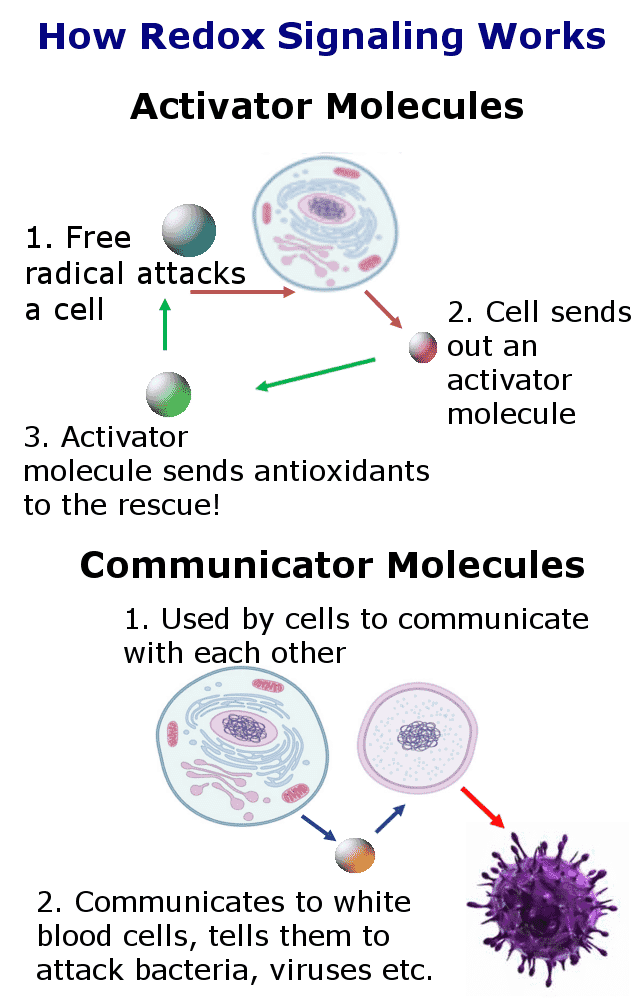Redox Signaling is the process used by cells to communicate with each other. Free radicals, reactive oxygen species and other electronically activated radicals to ‘signal’ cell distress and many other vital bodily functions. Redox signaling is how cells in our body respond to oxidation and aging.
How Redox Signaling Activates your Body’s Antioxidant Response

The Redox signaling system relies on two molecules – “communicator” and “activator”. These molecules are the communicators between every cell in the body. These two molecules are called ‘signaling molecules’. Their signals activate the body’s antioxidant compounds – Glutathione, Superoxide Dismutase (SOD) and Catalase.
Both types of redox signaling molecules are produced naturally in the cells. The “activator” molecules trigger the release of antioxidants stored in the body. Antioxidants don’t do anything unless activated by the redox signaling molecules. Thus the Redox signaling ‘activator’ molecules activate your body’s antioxidant response.
The communicator molecules are responsible for communication between the cells of the body. They ensure optimum performance of the immune system and protect the body against external harm from foreign invaders like bacteria, viruses etc. The cells in our body are able to communicate and function because of the Redox signaling system.
The Impact of the Redox System on Your Health
Internal and external factors like stress, toxic chemicals, bacterial infections, oxidative foods and more affect our health and result in a loss of redox signaling molecules. When the redox signaling system declines, antioxidants are unable to function effectively. Cells and DNA become oxidized, which leads to a vast range of health ailments.
Research on the Redox Signaling System
The first ever study conducted on the Redox system and its role in cell signaling examined the impact of failing redox signaling on mental illness. The study was based on the Adrenochrome hypothesis: “psychoactive oxidative products of catecholamines (adrenochromes) play a role in schizophrenia and other neuropsychiatric diseases”. The Adrenochrome hypothesis is still being studied, but the study did confirm that the redox signaling system has a role in the prevention of oxidative stress.
The Role of Oxidative Stress in Eye and Neurological Diseases
A second study showed that oxidative stress has a role in eye problems and neurological disorders. According to the study:
Electronically activated oxygen molecules such as superoxide or peroxide are known to be the significant factors responsible for certain disorders of the eye and nervous system. For instance, a person with high levels of homocysteine or copper often shows four characteristic signs – psychotic behavior, movement disorders, deafness, and pigmentary abnormalities. Both copper and homocysteine act as catalysts in the production of reactive oxygen molecules, and the above-mentioned abnormalities can be a result of the Redox signaling process caused by these reactive molecules.
This theory suggests that active oxygen species (free radicals) may work as transmitters – they can trigger, cause and spread damage – for a variety of health problems including inflammation and fibrosis.
Free radical damage is also thought to be a factor in aging. According to research performed at Harvard University, oxidation causes shortening of telomeres – small bits of protein that protect the DNA from damage. Too many oxidative molecules present in the blood and skin cells is believed to be a factor in the breakdown of DNA telomeres.
Redox signaling and autoimmune problems
Improper balance of Redox signaling molecules causes the immune system to attack healthy cells, which divide and further spread the damage. Autoimmune problems occurs when the body attacks itself. An excess of redox signaling molecules is thought to trigger an excessive autoimmune response, but this theory is still being studied and hasn’t been confirmed yet.
Redox Signaling is an important part of good health
Cells and DNA are damaged by sunlight, toxins, oxidative foods, infections, and other irritants. Damaged cells can actually build up oxidants or free radicals and make the problem worse!. The Redox signaling process triggers the antioxidants that neutralize the free radicals and maintain a balance of oxidative molecules in the body. A properly functioning redox signaling system ensures that the immune system attacks foreign invaders, but does not attack your own body.
When the system breaks down the balance of activated oxygen molecules is upset, which leads to cellular damage, aging, and other health ailments.
Is alkaline water an antioxidant?
By itself, alkaline water has antioxidant potential, but that potential needs to be “unlocked” by pairing it with another antioxidant like vitamin C. One of the most popular ways to do this is by mixing alkaline water with a little bit of lemon juice. There are many more benefits to adding a little lemon juice to your alkaline water as well.
Need to know if alkaline water can help you with your health challenges? Call us at 855-403-5579 for a personal consultation with one of our healthy water experts
 Save $500 on MXL Models 9-15 / Valid Until October 6
Save $500 on MXL Models 9-15 / Valid Until October 6
3 comments